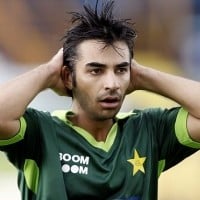Top 10 Cricketers Who Have Been Accused of Match/Spot Fixing Scandals
In organized sports, match fixing occurs as a match is played to a completely or partially pre-determined result, violating the rules of the game and often the law. The most common reason is to obtain a payoff from gamblers, but players may also intentionally perform poorly to gain a future advantage, such as a better draft pick or an easier opponent in a play-off. A player might also play poorly to rig a handicap system.Match fixing, when motivated by gambling, requires contacts (and normally money transfers) between gamblers, players, team officials, and/or referees. These contacts and transfers can sometimes be found, and lead to prosecution by the law or the sports league. In contrast, losing for future advantage is internal to the team and very hard to prove. Often, substitutions made by the coach designed to deliberately increase the team's chances of losing (such as having key players sit out, using minimal or phantom injuries as an excuse), rather than ordering the players actually on the field to intentionally underperform, are cited as the main factor in cases where this has been alleged.
Match fixing generally refers to fixing the final result of the game. Another form of match fixing, known as spot fixing, involves fixing small events within a match which can be gambled upon, but which are unlikely to prove decisive in determining the final result of the game.
In cricket, match fixing occurs as a match is played to a completely or partially pre-determined result, violating the rules of the game and often the law. In particular, players have been approached by bookmakers and bribed to throw matches or aspects of matches (such as the toss), or provide other essential information. Fixing has happened in both international - including Test matches and One Day Internationals - and domestic cricket. The ban is issued by the International Cricket Council, the sport's governing body, or by the respective cricket board to which the player belongs. A ban may be for match fixing or spot-fixing. Both are misdemeanours banned under the ICC Cricket Code of Conduct.
Here is a list of cricketers who have faced punishment due to Match/Spot fixing by the International Cricket Council. I have listed the items in this manner - 'Cricketer - Associated country'
These three Pakistani bowlers were accused of bowling planned no-balls against England in August 2010. In November 2011 Amir was sentenced to six months in a young offenders institution by Southwark Crown Court, England, for conspiracy to cheat at gambling and conspiracy to accept corrupt payments. Asif and Butt were imprisoned in the same place for 12 and 30 months respectively. Amir, Asif and Butt were suspended from all forms of International and First Class cricket for 5, 7 and 10 years respectively.
Azharuddin was alleged in 2000 for associating with bookmakers and for allegedly providing information to bookies and introducing South African team captain Hansie Cronje to betting. He was banned from playing any forms of cricket for life. On 8 November 2012, the life ban was overturned as the case was deemed unsustainable.
Sreesanth was caught when he gave 14 runs in an over as planned in an Indian Premier League match for Rajasthan Royals against Kings XI Punjab on 9 May 2013. He was arrested on 16 May 2013 for accepting money from bookies to underperform, but was released on bail a month later. He is banned from participating in all forms of Domestic and International cricketb for life.
Gibbs initially agreed to under-perform in an ODI game at Nagpur, but reneged on the deal and scored 74 off just 53 balls. The recorded conversation between Gibbs and the alleged bookmarker was found by the Nagpur Police, and was banned from participating in International Cricket for 6 months.
After the West Indies' T20I World Cup win, he was banned from International Cricket for 2 years for initially agreeing to alleged bookmarkers to underperform in the World Cup, but he reneged the deal and played extremely well.
33-year-old Tsotsobe who played in five tests and 61 one-day internationals, was charged in April 2017 with contriving to fix or improperly influence matches in the South Africa domestic Twenty20 Series and seeking to accept, or agreeing to accept, a bribe. Lonwabo Tsotsobe admitted one charge of contriving to fix a match and nine separate charges of failing to co-operate properly with various investigations.
The Former Team captain of South Africa was found guilty of accepting monetary rewards from bookmakers for providing information and for fixing matches in various instances and is now banned from participating in International Cricket for life.
Ashraful was banned from participating in International and domestic cricket for 8 years for his involvement in fixing in the 2013 season of the Bangladesh Premier League season 2.
Bodi was a well known cricketer who was banned from all forms of registered cricket for 20 years on accusation of attempting to fix matches in the Ram Slam Twenty20 competition matches in South Africa in various years.
He was banned sometime around the 90s for illegally providing information to bookmarkers on various instances. His ban was overturned in 2003.
